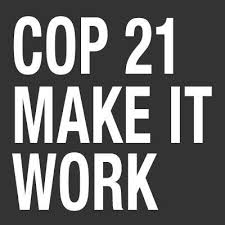

Economy
14 Major Companies Voice Support For A Paris Climate Agreement
Fourteen leading companies based or with major operations in the United States voiced strong support today for the adoption of a new global climate agreement at the U.N. Climate Change Conference this December in Paris.
In a statement organized by the Center for Climate and Energy Solutions (C2ES), the companies called for “a more balanced and durable multilateral framework guiding and strengthening national efforts to address climate change.”
The Paris agreement, the companies said, should commit countries to undertake nationally determined efforts to reduce greenhouse gas emissions; provide strong transparency to hold countries accountable; require periodic renewal of national contributions to progressively strengthen the global effort; and facilitate global carbon markets.
“We recognize the rising environmental, social, economic, and security risks posed by climate change, and that delaying action will result in greater risks and costs,” the statement said. “We stand ready to work with governments and our civil society partners to deliver and implement a sensible and effective global climate agreement in Paris.”
The statement was endorsed by Alcoa, Alstom, BHP Billiton, BP, Calpine, HP, Intel, LafargeHolcim, National Grid, PG&E, Rio Tinto, Schneider Electric, Shell, and Siemens Corporation. The companies have combined revenues of $1.1 trillion and more than 1.5 million employees.
“These are companies with real skin in the game – either they’re large emitters or their products are. They know emissions need to come down and are taking steps on their own. But they believe the low-carbon transition requires stronger leadership from governments, too,” said C2ES President Bob Perciasepe. “These leading companies support a Paris agreement that gets all the major economies on board, provides stronger long-term direction, and holds countries accountable.”
Governments are in the final stages of a four-year round of negotiations toward a new global agreement under the 1992 U.N. Framework Convention on Climate Change (UNFCCC). The agreement is to be concluded at the 21st session of the Conference of the Parties (COP 21) set for Nov. 30-Dec. 11 in Paris.
The companies cited multiple ways a new agreement under the UNFCCC can help strengthen the role of the private sector in addressing in climate change:
– An aim of progressively decarbonizing the global economy can provide a clearer signal to markets to shift long-term investments toward energy efficiency and other lower-carbon alternatives.
– Requiring countries to be transparent about their policy intentions and implementation can provide greater clarity on domestic policy landscapes, helping companies anticipate regulatory risks and economic opportunities.
– Agreement by all major economies to contribute their fair share, and to simultaneously and regularly renew their contributions, can lead towards greater comparability of effort, helping to ease concerns about potential carbon leakage and competitive imbalances.
– Requiring countries engaging in international carbon trading to ensure the environmental integrity of these transactions can help facilitate the growth and credibility of the global carbon market, a critical tool for cost-effective emissions reduction.
The full statement is here.


 Environment12 months ago
Environment12 months agoAre Polymer Banknotes: an Eco-Friendly Trend or a Groundswell?

 Features11 months ago
Features11 months agoEco-Friendly Cryptocurrencies: Sustainable Investment Choices

 Features12 months ago
Features12 months agoEco-Friendly Crypto Traders Must Find the Right Exchange

 Energy11 months ago
Energy11 months agoThe Growing Role of Solar Panels in Ireland’s Energy Future



























